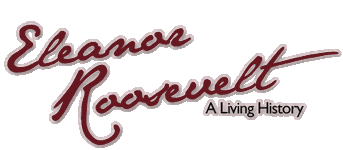
First Lady — Author — Activist — Humanitarian
Program Descriptions
Multiple one-hour programs are available that focus on specific issues of relevence to today's audiences. Each program consists of a monologue in-character, followed first by a question and answer period with "Eleanor Roosevelt" and then by a question and answer period with the scholar/presenter.
Each program also looks behind Eleanor Roosevelt's public life to reveal varying aspects of her development. We learn about the little girl who lost both parents before the age of ten, the debutante who felt trapped by society’s expectations, and the young wife who raised five children before emerging as one of the 20th century’s most remarkable women.
"This is My Story"
Eleanor Roosevelt during the Great Depression
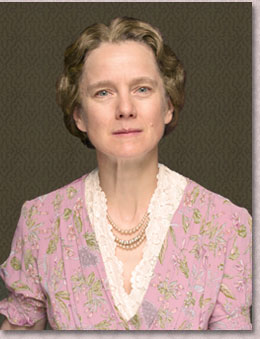
Meet first lady Mrs. Franklin D. Roosevelt in 1937, during her husband’s second term as president. For almost two decades Eleanor Roosevelt had worked to advance minimum wage, maximum hours, laws against child labor, women's rights, women's representation in government, world peace, civil rights, and other progressive causes. A few days after FDR was installed in office in 1933, she held a press conference — for women reporters only. No other "first lady" had ever held a press conference, had ever taken on such a public role. She continued to advance her causes while her husband was in office. Furthermore, Eleanor often served as her husband's "eyes and ears" across the United States by inspecting factories, inner city tenements, military camps, and even coal mines.
Today, eight decades later, it is easy to take for granted the existence of Social Security, Minimum Wage, the Security Exchange Commission, Labor’s right to organize and bargain, and even the United Nations. But none of these existed when President Franklin Delano Roosevelt took office in March of 1933. What was Eleanor Roosevelt’s role in those first years of the New Deal? What formative experiences made her such a force in the world? How can we learn from her example in addressing the economic and social issues of today?
Through a series of vignettes, witness alternating glimpses into Eleanor Roosevelt's pubic and private personae. Mrs. Roosevelt moves back and forth between an intimate setting of speaking off the record with close friends and a podium setting for her public addresses.
"What We Are Fighting For"
Eleanor Roosevelt during World War II
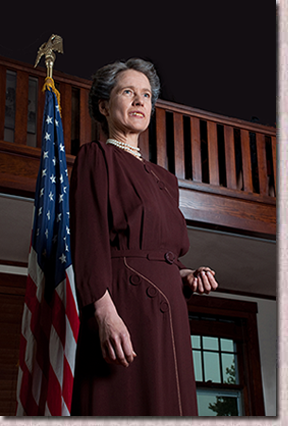
War is a controversial topic any day of the week. The stakes are higher if you have been working for world peace for over twenty years -- ever since the end of the first World War, the "war to end all wars" -- and your husband is the president of the United States while your country is embroiled in the largest war the planet has ever known. How does one stay true to one’s ideals in the midst of war’s mayhem? How can we build the world we want while surrounded by tumult?
It is December 1942. Mrs. Franklin D. Roosevelt has just returned from England where she visited with soldiers, generals, royalty, and the working people. Find out how the First Lady feels about the individual’s role in a world torn by war, hardship, and uncertainty.
"Hammering Out Human Rights"
Eleanor Roosevelt at the United Nations
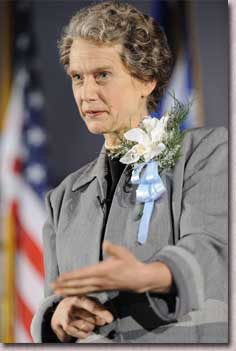
Dubbed "First Lady of the World" by President Truman, Eleanor Roosevelt speaks of the ground-breaking, grueling, tempestuous, and eventually triumphant development of the Universal Declaration of Human Rights, a Magna Carta for humankind. Along the way, we gain insights to what brought Mrs. Roosevelt to be at the United Nations in the first place and the fears that are currently (in 1950) stoking animosities between the Soviet Union and the United States. You may be surprised to find out why Human Rights are important to your life and to the strength of the country.
"The Power of Words"
Eleanor Roosevelt Reflects Across the Decades
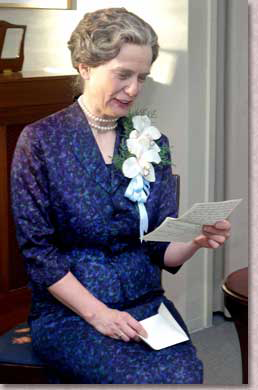
From words of her father that gave her strength, to famous words by her husband that helped the nation through the Great Depression; from her own words spoken to audiences or given over the radio, to observations and opinions written into over 4100 articles in her six-days-a-week My Day column (that is, to date, as of early 1950 when the program is set) Eleanor Roosevelt shows how words well chosen can bring attention to a topic, awaken understanding, and bring the listener to a new point of view. Specific subject matter addresses such diverse topics as: unemployment, race relations, honoring servicemen, economic ties with Mexico, and international co-operation. Mrs. Roosevelt includes a segment on how words misused can be harmful as well: hurtful to an individual, harmful to a group, or endangering to a whole nation. The program culminates with a brief look at the Universal Declaration of Human Rights.
"The Vote Alone is Not Enough"
Eleanor Roosevelt on Women's Rights
Eleanor Roosevelt examines Women’s Rights from the point of view of 1950, celebrating the 30th anniversary of the ratification of the 19th Amendment. She notes that there were those who asserted the economy would be ruined and the world would collapse if women got the vote; while others insisted that war and human suffering would end once women were granted suffrage. Neither have come to pass. But some very interesting progress and struggles have occurred along the way. Mrs. Roosevelt looks back on both the suffrage movement and her own development in awareness of Women’s Rights; reviews what progress has and has not been made; and looks forward to what we need to focus on next.